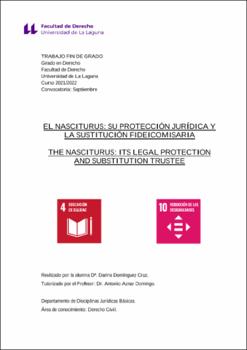El nasciturus: su protección jurídica y la sustitución fideicomisaria.
Author
Domínguez Cruz, DarinaDate
2022Abstract
En el presente trabajo, se ha llevado a cabo el análisis de la protección
que goza el concebido no nacido en el Derecho Civil, es decir, el nasciturus. Para ello, se
ha elaborado un examen exhaustivo de las tradiciones sobre la protección del nasciturus,
atendiendo a lo dispuesto en el propio Código Civil, y nuestras Ley de Enjuiciamiento
Civil. Así, se hará referencia en gran parte a la figura de la sustitución fideicomisaria, a
través de la cual, se hace un encargo a un tercero para que disponga y adquiera de esos
bienes, siendo su voluntad que cuando el concebido no nacido nazca, y, una vez nacido,
adquiera la mayoría de edad, pueda adquirir esos bienes que aquel tercero –llamado
fiduciario—ha, digamos, gestionado esos bienes todo ese tiempo. De este modo, e
introduciéndome de lleno en la sustitución fideicomisaria, trataré todos sus aspectos, tales
como sus requisitos, efectos, y todo aquello que la misma conlleva. : In the present work, the analysis of the protection enjoyed by the unborn
conceived in Civil Law, that is, the nasciturus, has been carried out. To this end, an
exhaustive review of the traditions on the protection of the unborn has been prepared, in
accordance with the provisions of the Civil Code itself, and our Civil Procedure Law.
Thus, reference will be made largely to the figure of fideicommissary substitution,
through which a third party is commissioned to dispose of and acquire these assets, being
their will that when the unborn conceived is born, and, once born, becomes of legal age,
can acquire those assets that third party – called trustee – has, let's say, managed those
assets all that time. In this way, and fully introducing myself into the trustee substitution,
I will deal with all its aspects, such as its requirements, effects, and everything that it
entails.





